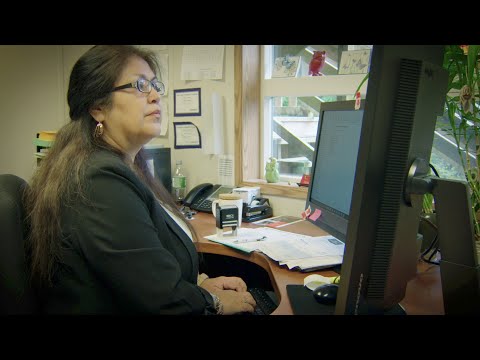Career Overview
Accounting technicians and bookkeepers manage the way the day-to-day financial records of a business are kept. They may work with Chartered Professional Accounts (CPAs) and other accounting professionals or they may offer personal bookkeeping services.
Job Titles
Duties
In general, accounting technicians and bookkeepers:
- Keep financial records
- Create, maintain and balance accounts using manual and computerized systems
- Post journal entries
- Make sure that transactions are recorded in the company’s books and match bank or credit card statements (account reconciliation)
- Prepare trial balances
- Keep general ledgers
- Prepare financial statements
- Calculate and prepare paycheques, payments for utilities, taxes and other bills
- Complete and submit taxes, workers' compensation and pension contribution forms and other government documents
- Prepare tax returns
- Prepare statistical, financial and accounting reports
Earnings
Earnings is income that workers receive in exchange for their labour. Depending on the type of employment, earnings can be in the form of wages (hourly), salaries (fixed monthly or annual) or self-employed earnings.
Work Environment
# Workers Employed
24,080% Employed Full Time
42%Accounting technicians and bookkeepers typically work in an office from Monday to Friday. They may work for small, medium or large businesses, or be self-employed and work from a home office. In larger companies, their job might only be bookkeeping related, but in smaller companies they may have other duties.
This type of work means long hours at a desk using a computer, which may cause muscle strain, sore eyes or headaches. Sitting for a long time can also affect blood flow or cause back pain. As a result, some people in this career use sit-stand desks and other supports to avoid these health problems.
Career Pathways
With further training, accounting technicians and bookkeepers can move into professional accounting and management or supervisory jobs. They can also become self-employed.
Occupational Interests
It’s important to understand what kinds of occupations align with your interests.
For more about occupational interests visit Skills for the Future Workforce > Characteristics.
Here are the top occupational interest(s) for this career profile:
Education, Training and Skills
- A secondary school diploma, along with one of the following:
- Completion of a college program in accounting, bookkeeping or a related field
- Completion of prerequisite courses for entry into the Chartered Professional Accountants (CPA) program may be required
- Bookkeeping or accounting courses, along with several years of financial or accounting clerk experience
- A strong understanding of computers and cloud applications
- The ability to use Microsoft Office and/or other similar desktop applications
In addition, those in this role who gain certification in cloud-based accounting platforms and associated applications may find themselves in greater demand.
Education programs in B.C.

Top Skills
Every job calls for a certain set of skills. Knowing those skills is the first step in finding a good career fit.
Here, you will find the 10 most relevant workplace skills. Some are more important to achieving success in a certain career than others. These skills may come naturally to you or you may need to gain them through education, training and experience.
See the list of work-related skills below, ranked in order of importance for this career. Check out the list and see if this career matches your skills—take that first step!
Using mathematics to solve problems.
Giving full attention to what other people are saying, taking time to understand the points being made, asking questions as appropriate, and not interrupting at inappropriate times.
Understanding written sentences and paragraphs in work-related documents.
Using logic and reasoning to identify the strengths and weaknesses of alternative solutions, conclusions or approaches to problems.
Talking to others to share information effectively.
Communicating effectively in writing as appropriate for the needs of the audience.
Keeping track of and assessing your performance, other individuals, or organizations to make improvements or take corrective action.
Managing one’s own time and the time of others.
Being able to solve novel, ill-defined problems in complex, real-world settings.
Actively looking for ways to help people.
Labour Market Statistics
Discover data, facts and information that have been gathered and analyzed. Learn about the characteristics of the economy and labour market in B.C.
Employment
Find out about employment types and trends by region and industry.
Employment
24,080Employment by Region







| Region | Employment | % Employment of this Occupation |
|---|---|---|
| Cariboo | 975 | 4.0% |
| Kootenay | 865 | 3.6% |
| Mainland/Southwest | 13,310 | 55.3% |
| North Coast and Nechako | 550 | 2.3% |
| Northeast | 595 | 2.5% |
| Thompson-Okanagan | 3,625 | 15.1% |
| Vancouver Island/Coast | 4,150 | 17.2% |
Labour Market Outlook
The B.C. Labour Market Outlook is a 10-year forecast of the expected supply and demand for labour in the province. It’s usually updated every year. The purpose is to provide British Columbians with the knowledge to make informed decisions on careers, skills training, education and hiring.
Forecasted Job Openings (2025-2035)
10,850Forecasted Job Openings
Forecasted Employment Growth Rate
Composition of Job Openings
Job Openings by Region (2025-2035)







| Region | Job Openings | Avg. Annual Employment Growth |
|---|---|---|
| Cariboo | 330 | 0.2% |
| Kootenay | 300 | 0.5% |
| Mainland/Southwest | 5,700 | 1.0% |
| North Coast and Nechako | 180 | 0.0% |
| Northeast | 260 | 1.0% |
| Thompson-Okanagan | 1,760 | 1.4% |
| Vancouver Island/Coast | 2,310 | 1.7% |
Industry Highlights
Learn about the opportunities in B.C.'s major industries, including employment trends, earning potential, locations of work and more.
Forecasted Job Openings by Industry
| Industry | Job Openings (2025-2035) |
|---|---|
| Professional, Scientific and Technical Services | 4,890 |
| Construction | 1,170 |
| Finance, Insurance and Real Estate | 710 |
| Health Care and Social Assistance | 640 |
| Retail Trade | 610 |
Insights from Industry
Employers often look to hire experienced accounting technicians and bookkeepers, which means that it can be hard for people to find work right after they finish their education. Experience in this career may be gained by doing volunteer work or through a co-operative education program. Often, office administrators in small companies are asked to do bookkeeping tasks; so, starting off with this job is another way to gain experience.
In B.C., it is not necessary to be licensed to practice as a bookkeeper.
Technology has changed the way accounting technicians and bookkeepers do their work. Being able to adapt quickly to change is necessary. Small business owners often want to invoice, collect payments, and update their books in only a few steps. People in this occupation typically use technology, including cloud-based accounting software associated applications, mobile apps, online banking and email.
Resources
-
Canadian Bookkeepers Associationc-b-a.ca
-
Canadian Institute of Bookkeeping (CIB)www.cibcb.com
-
Chartered Professional Accountants of British Columbiawww.bccpa.ca
-
Institute of Professional Bookkeepers of Canadawww.ipbc.ca








